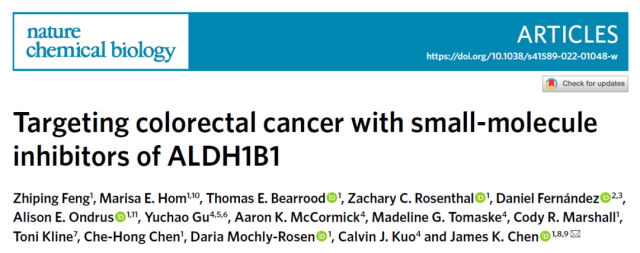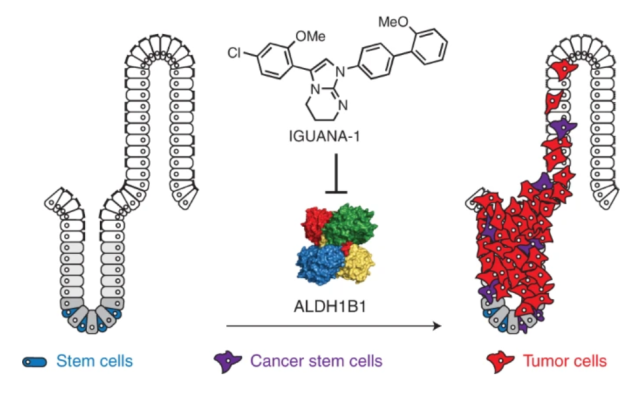A new target for colorectal cancer treatment – ALDH1B1
- Aspirin: Study Finds Greater Benefits for These Colorectal Cancer Patients
- Cancer Can Occur Without Genetic Mutations?
- Statins Lower Blood Lipids: How Long is a Course?
- Warning: Smartwatch Blood Sugar Measurement Deemed Dangerous
- Mifepristone: A Safe and Effective Abortion Option Amidst Controversy
- Asbestos Detected in Buildings Damaged in Ukraine: Analyzed by Japanese Company
A new target for colorectal cancer treatment – ALDH1B1
- Red Yeast Rice Scare Grips Japan: Over 114 Hospitalized and 5 Deaths
- Long COVID Brain Fog: Blood-Brain Barrier Damage and Persistent Inflammation
- FDA has mandated a top-level black box warning for all marketed CAR-T therapies
- Can people with high blood pressure eat peanuts?
- What is the difference between dopamine and dobutamine?
- How long can the patient live after heart stent surgery?
Nature Chemical Biology: A new target for colorectal cancer treatment – ALDH1B1.
Colorectal cancer (CRC) is the third most common cancer in the world, with nearly 2 million new cases each year (second only to breast and lung cancer) and nearly 1 million deaths each year (second only to lung cancer). in lung cancer).
Colorectal cancer (CRC) is the third most common cancer in the world , with nearly 2 million new cases each year (second only to breast and lung cancer ) , and nearly 1 million deaths each year (second only to lung cancer). in lung cancer ) . About 1 in 25 people will develop colorectal cancer in their lifetime.
In some countries, the annual incidence of colorectal cancer is second only to liver cancer, with 560,000 new colorectal cancer patients in 2020.
What’s more, the incidence of colorectal cancer in the younger population under the age of 50 has been rising for nearly 30 years.
Alcohol dehydrogenase (ADH) in the liver is responsible for catalyzing ethanol (alcohol) to acetaldehyde, and acetaldehyde dehydrogenase (ALDH) is responsible for further catalyzing the produced acetaldehyde to harmless acetic acid.
In humans, the aldehyde dehydrogenase (ALDH) family consists of multiple isoenzymes.
Previous studies have observed cancer cells with high levels of ALDH activity in a variety of cancers, and these cancer stem cells are more tumorigenic, chemoresistant, and metastatic. For example, breast cancer, glioma, melanoma, and non-small cell lung cancer stem cells have high levels of ALDH1A3, while colorectal cancer (CRC) and pancreatic ductal adenocarcinoma (PDAC) cancer stem cells express high levels of ALDH1B1 .
Recently, the team of Professor James K. Chen of Stanford University published a research paper entitled: Targeting colorectal cancer with small-molecule inhibitors of ALDH1B1 in the journal Nature Chemical Biology .
The study developed an ALDH1B1 selective inhibitor , IGUANA-1 , which can selectively inhibit ALDH1B1, thereby inhibiting the growth of colorectal cancer cells and colorectal cancer cell-derived organoids, confirming that ALDH1B1 is in the colon. It plays an important role in rectal cancer, and it also provides a new direction for the treatment of colorectal cancer.

ALDH1B1, the hospital of the ALDH family, is located in the mitochondria, ALDH1B1 is significantly upregulated in colorectal cancer, and reducing ALDH1B1 expression is able to inhibit the growth of colorectal cancer.
In addition, ALDH1B1 is also highly expressed in human pancreatic ductal adenocarcinoma (PDAC) and is required for genetically engineered mice with KRAS gene mutation-driven pancreatic ductal adenocarcinoma.
In this latest study, the research team developed a selective inhibitor of ALDH1B1, IGUANA-1 , a small molecule compound of guanidine and imidazole , both of which can target the active site of ALDH1B1. Furthermore, guanidines avoid off-target mitochondrial toxicity exhibited by imidazoles.
 IGUANA-1 selectively targets and inhibits the ALDH1B1 protein, thereby inhibiting the growth of colorectal cancer cells and colorectal cancer organoids.
IGUANA-1 selectively targets and inhibits the ALDH1B1 protein, thereby inhibiting the growth of colorectal cancer cells and colorectal cancer organoids.
The research team also further revealed the expression of genes affected by ALDH1B1 inhibition through single-cell transcriptome sequencing, among which multiple genes related to mitochondrial metabolism (ATP5ME, ATP5PO, LDHB, NDUFB1, NDUFB8, NDUFC2, NDUF1A, NDUFA9, NDUFA11 , UQCR11) and genes related to ribosome biogenesis and function (RPL15A, RPL21, RPL26, RPL29, RPL38, TMA7) were down-regulated.
In addition, the expression of KRT15 and DCLK1 genes, which are genetic markers of colorectal cancer stem cells, were also down-regulated.
Overall, this study supports the important role of ALDH1B1 in colorectal cancer, shows that ALDH1B1 inhibitors are a potential treatment for colorectal cancer, and provides a new direction for the development of ALDH1B1-targeted therapies.
A new target for colorectal cancer treatment – ALDH1B1
(source:internet, reference only)
Disclaimer of medicaltrend.org
Important Note: The information provided is for informational purposes only and should not be considered as medical advice.



